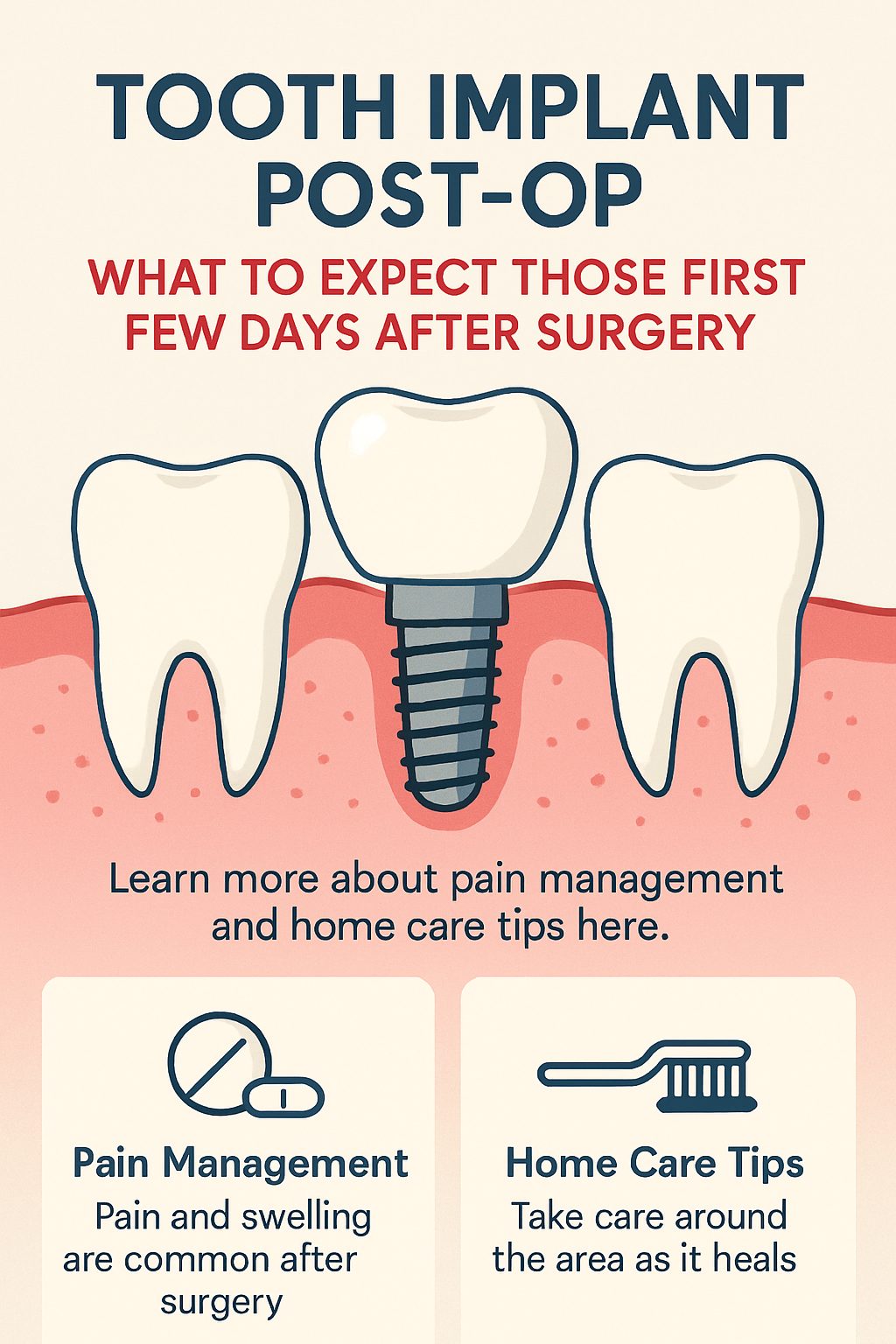If you recently had a dental implant or are planning one, this short tooth implant post op guide will help you know what to expect and how to heal safely. A normal tooth implant post op recovery includes some bleeding, swelling, and mild-to-moderate pain that improves over days. This guide covers the first 48 hours, the first week, common problems, home care tips, and when to call your dentist. For anyone recovering from a tooth implant post op in Leeds, AL, these steps will make recovery smoother and safer.
Typical tooth implant post op timeline in Leeds, AL
First 24–48 hours
Expect light bleeding or oozing, swelling, and discomfort. Rest is essential. Keep gauze over the site for 30–60 minutes and change as directed. Lie with your head elevated for the first night to reduce swelling. Use ice packs on the outside of the cheek for 20 minutes on, 20 minutes off for the first 24–48 hours. Follow your prescribed medication schedule exactly. If bleeding soaks more than one gauze pad every 30–45 minutes, contact your dentist.
Days 3–7
Swelling and bruising usually peak around day 3 and then improve. Stitches may dissolve on their own or be removed at a 7–10 day visit. You can slowly increase light activity but avoid heavy lifting or strenuous exercise. Start returning to more regular soft foods as comfort allows. Normal signs of progress include less pain each day, reduced swelling, and no new bleeding.
Weeks 2–12
This is the bone and gum healing phase (osseointegration). You may feel tightness or mild tingling as numbness fades. Sensations change as bone bonds to the implant. Final abutment placement or the permanent restoration is usually planned between 8–12 weeks, depending on your healing. Keep up soft-care habits and follow your dentist’s timing for restoration.
Managing pain and swelling after a tooth implant post op in Leeds, AL
Medications and prescription guidance
Common pain control includes ibuprofen (Advil/Motrin) and acetaminophen (Tylenol); your surgeon may prescribe stronger analgesics for short-term use. If antibiotics are prescribed, finish the full course. Avoid aspirin unless your provider says it’s okay, as it can increase bleeding. Always follow your surgeon’s dosing and timing. If you have health conditions or take blood thinners, check with the office before taking OTC drugs.
Home measures that help
Use ice packs for the first 48 hours, 20 minutes on and 20 minutes off. Keep your head elevated when sleeping for the first few nights. Stick to a soft diet and avoid hot, spicy, or crunchy foods that irritate the site. Don’t use straws or spit forcefully for the first week to protect blood clots. If pain worsens after initial improvement, or if swelling increases after day 3, call your dentist right away.
Eating, oral hygiene, and activity rules after tooth implant post op
What to eat and what to avoid
Choose cool or lukewarm soft foods: yogurt, mashed potatoes, scrambled eggs, smoothies without a straw, applesauce, and blended soups. Gradually reintroduce firmer foods after a week or as your dentist advises. Avoid hard, crunchy, sticky, or chewy items for several weeks. Skip seeds, nuts, and foods that can get stuck in the wound.
Brushing, rinsing, and tobacco/alcohol guidance
Keep the mouth clean but be gentle near the surgical area. Use a soft-bristled brush and avoid direct scrubbing of the implant site for the first few days. Begin gentle saltwater rinses (1/2 teaspoon salt in 8 oz warm water) 24 hours after surgery, 3–4 times daily. Avoid vigorous swishing. Do not smoke or use nicotine products for at least two weeks—tobacco delays healing and increases failure risk. Avoid alcohol while taking antibiotics or strong pain meds and while healing.
Signs of complications after a tooth implant post op in Leeds, AL — when to call your dentist
Call your dentist if you notice:
- Increasing or severe pain after day 3
- Fever greater than 101°F
- Heavy or prolonged bleeding not controlled by pressure
- Visible pus or foul drainage
- Loose or mobile implant
- Persistent or worsening numbness beyond a few weeks
For life-threatening signs (trouble breathing or swallowing, severe uncontrolled bleeding), go to the nearest emergency room. For other concerns, call your dental office for next steps and same-day advice when possible.
Follow-up visits and tips to improve long-term implant success
Typical follow-up schedule: a phone check or visit within 48–72 hours, suture check at 7–10 days, healing assessments at 4–8 weeks, and restoration planning around 8–12 weeks. Long-term care includes regular dental cleanings, good home oral hygiene, and a night guard if you grind your teeth. Keep periodontal health strong—gum disease is the main long-term threat to implant success.
Need support after your tooth implant post op? Koplon Implant & Family Dentistry — light practice mention
Koplon Implant & Family Dentistry offers coordinated surgical and restorative care for Leeds-area patients. The practice provides in-house lab work, sedation options, and experience with full-arch and single-tooth implants. Call the office if you have post-op concerns or to schedule follow-ups; the team can advise you or arrange an urgent visit when needed.
Quick one-page tooth implant post op checklist
- Meds: take prescribed pain meds and antibiotics as directed
- Ice: 20 min on / 20 min off for first 48 hours
- Rest: keep head elevated first night, avoid heavy activity for 3–7 days
- Foods: soft diet (yogurt, mashed potatoes, eggs, soups), no straws
- Oral care: gentle brushing, salt rinses starting 24 hours after surgery
- No smoking or alcohol during healing
- Watch for warning signs: fever, increasing pain, heavy bleeding, pus, loose implant
- Follow-up: schedule suture check and healing visits per your dentist
- Emergency: go to ER for severe breathing issues or uncontrolled bleeding; call office for non-emergency concerns





